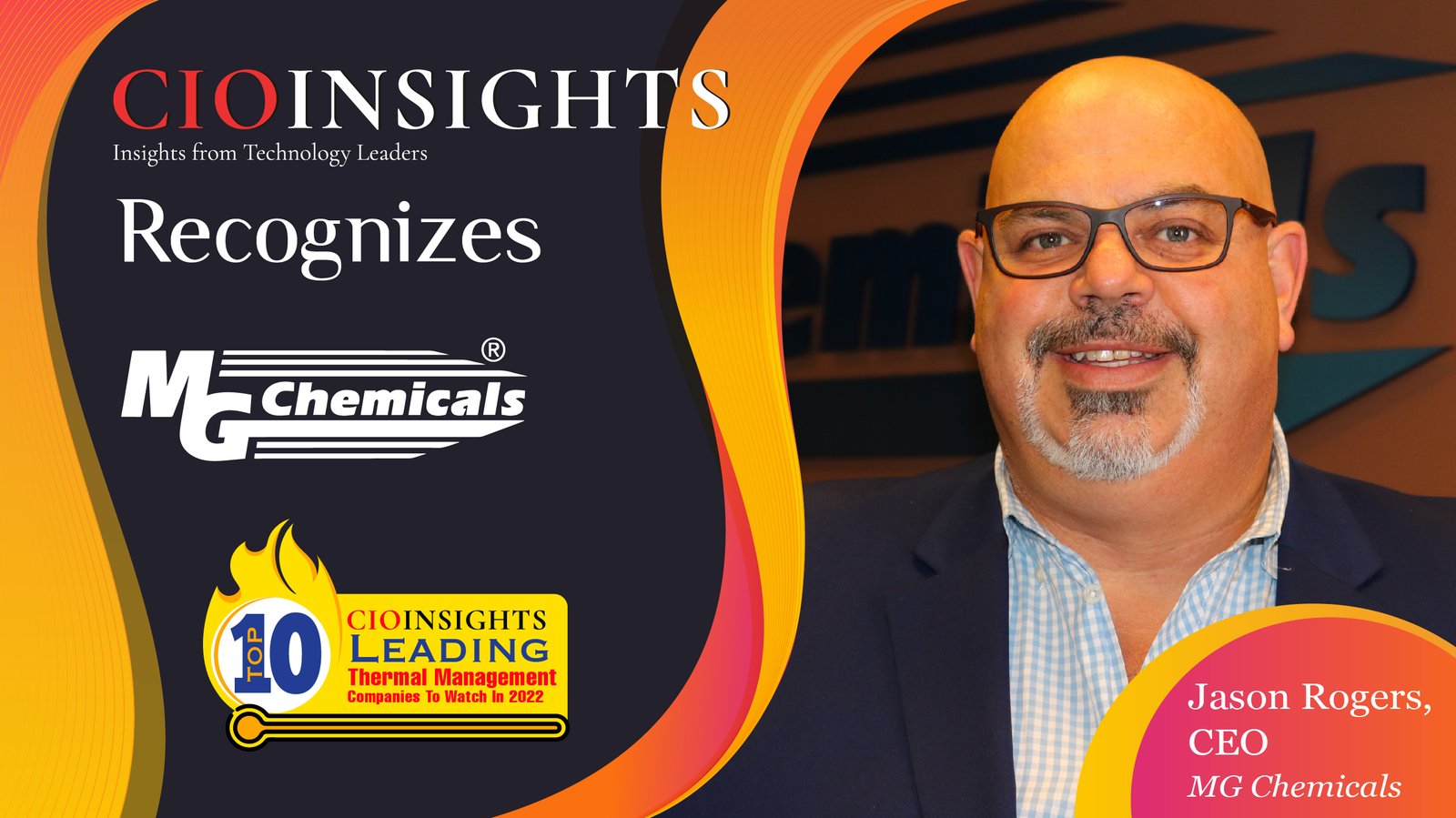Top 10 Leading Thermal Management Companies To Watch In 2022
.jpeg)

With the current trend of electronics design becoming more compact and
powerful, electronics designers face new challenges and difficulties in keeping the
design compact while maintaining the heat output at the optimal level.
Fortunately for these electronics designers, companies like MG Chemicals
understand their predicament and develop an extensive portfolio of thermal
management products. The products like thermal greases and adhesives, gap
fillers, and thermal potting compounds offer solutions to a wide market base
ranging from large industrial manufacturers to hobbyists.
Speaking about the current trends that may have an impact on the Thermal
Management arena in 2022 and how MGC plans to leverage them –
Jason Rogers, CEO of MG Chemicals, said, "Telecommunications
equipment process a constant flux of data, generating heat as a by-product,
making thermal management a critical component of their design. Another
industry is electric vehicle (EV) designers, who are challenged with
designing powerful yet compact battery systems that won't overheat and
malfunction. The R&D team at MGC works with its suppliers to learn about
novel raw ingredients that offer the performance needed to formulate
products which address emerging thermal management issues."
As mentioned earlier, there are numerous challenges in the Thermal Management
space. One good example of an industry facing considerable thermal
management challenges is electric vehicle manufacturers.
"The battery pack design must balance aerodynamic constraints (keeping the
pack's weight as light as possible to reduce drag) with power output to improve
range. This design is difficult to control the heat output. Solving these issues
requires an intimate understanding of the different design parameters needed for
an effective thermal management solution that is not exclusively confined to just
the material's heat-dissipation properties. MG Chemicals understands additional
requirements, such as material viscosity, environmental resistance, and bond line
thickness, must be addressed to provide customers with sustainable, holistic
solutions," said Jason Rogers.
Elaborating on their statement – We provide chemical solutions for the electronics
industry – Jason Rogers said that there are several challenges electronics
manufacturers face when designing a product to maintain proper function.
Some challenges include protection from the external environment,
electromagnetic interference (EMI), the mechanical stability of circuit components,
and thermal management.
While numerous organizations address some of these issues, MG Chemicals has
a full line of products for all these challenges. The reason why they are a one-stop
shop for their customers.
"The R&D team at MG has the knowledge and experience needed to find
solutions for new product development challenges. MGC offers products that
address unique challenges within thermal management, such as our thermally
conductive adhesives ranging from flowable to paste consistency that suits
different part orientations and provides a permanent bond with exceptional
environmental resistance. Our thermal greases are another line of products that
offer outstanding heat dissipation yet do not permanently bond components
allowing for easy rework. Gap fillers offer designers exceptional thermal
conductivity and re-workability and do not bleed or run like grease. Overall, MG
has solutions for various design challenges within the thermal management
space," said Jason Rogers, CEO of MG Chemicals.
Talking about a case study, Jason revealed a case of a large manufacturer who
sought the services of MG Chemicals. MG chemicals have been contacted by a
large industrial manufacturer of electronic controllers and power converters.
The manufacturers were in their design phase of a controller for a traffic light
console. They required a thermally conductive potting solution as the controller
would produce heat that needed to be conducted out of the unit.
Additionally, the product needed to be flame retardant, room temperature curing,
and withstand aggressive temperature swings in an outdoor environment. With
extensive consultation, proof-of-concept testing, and prototyping, MGC qualified a
two-part, room temperature curing silicone potting compound, UL-certified for
flame retardancy. This project has been commercialized into full-scale production
with no field defects for the first three years.
Speaking about the competition and the strategies MG Chemicals employ to
thwart it, Jason said that customers don't approach them with sole thermal
management requirements. They seek attention to additional properties, including elastic modulus, adhesion, and thermal range, and consider packaging to have the broadest market appeal.
"MG Chemicals pays close attention to emerging trends in thermal management
needs and works closely with customers and suppliers to develop solutions that
align with key industry requirements. For example, the hardness of our thermally
conductive adhesives ranges from shore D 80 (very hard) to Shore E 45 (very
soft), while the viscosities available range from flowable (ideal for bonding
horizontal surfaces) to paste (standard for bonding components vertically like
thermocouples). In short, MG Chemicals understands there's no panacea
regarding thermal management materials. Still, our expansive portfolio has
solutions to fit a wide array of customer applications," said Jason.
The future is bright for the company with its strategic planning to formulate and
develop products that meet the growing demands of the industry. While there are
expansion plans on the product front, the company also plans to expand its
presence further in the EU and Asia regions.
In conclusion, the team at MG Chemicals talked about the leadership skills of their
former CEO, Howard Clark, and how the company grew under his leadership. The
company has pinned its trust on the new CEO, Jason Rogers, and looks forward
to the company growing more under the able leadership of Jason Rogers.



.png)


